- Home
- News & Features
- News
- FY2022
- Changing Latin American Lives through JICA’s Training: The Independent Living Movement of Persons with Disabilities
News
January 5, 2023
Changing Latin American Lives through JICA’s Training: The Independent Living Movement of Persons with Disabilities
Two remarkable women are changing the lives of those with disabilities in Latin America. The women, one Costa Rican and one Bolivian, both have disabilities themselves. Having completed JICA’s training in Japan, they are now working as part of Independent Living, a movement driven by persons with disabilities to create new systems and raise the social awareness that enables them to live and participate in their communities. Upon returning from Japan, they also mobilized, encouraging their governments to pass laws that would support Independent Living for persons with disabilities.
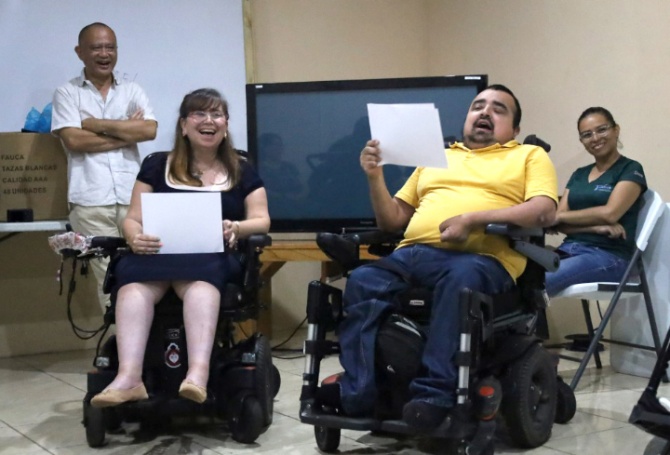 Wendy Barrantes (front left), president of Centro Morpho, an Independent Living center in Costa Rica for persons with disabilities, at one of the center’s events.
Wendy Barrantes (front left), president of Centro Morpho, an Independent Living center in Costa Rica for persons with disabilities, at one of the center’s events.
Changing the perception of independence
Wendy Barrantes first came to Japan in 2009, at the age of 35. Born in Costa Rica, she had developed muscular dystrophy when she was two-and-a-half years old, and had spent most of her life in a wheelchair. She spent her time in Japan participating in a one-and-a-half-month training program on Independent Living at the Mainstream Association, an Independent Living center of people with disabilities run by those with disabilities themselves, in Nishinomiya, Hyogo Prefecture. The program is part of the Knowledge Co-Creation Program conducted by JICA. For Barrantes, who had been living with her family in Costa Rica and receiving assistance from them, the training experience was a breath of fresh air. “Until then,” she said, “I had seen myself as an independent person. However, the training in Japan completely changed my perception.” At the Mainstream Association, Barrantes saw people with disabilities even more severe than hers living on their own, expressing their needs, and receiving assistance when necessary. “Seeing them led me to change my own attitudes toward independence. It motivated me to find a way to make it possible for those with disabilities in my own country to enjoy the same quality of life I experienced in Japan.”
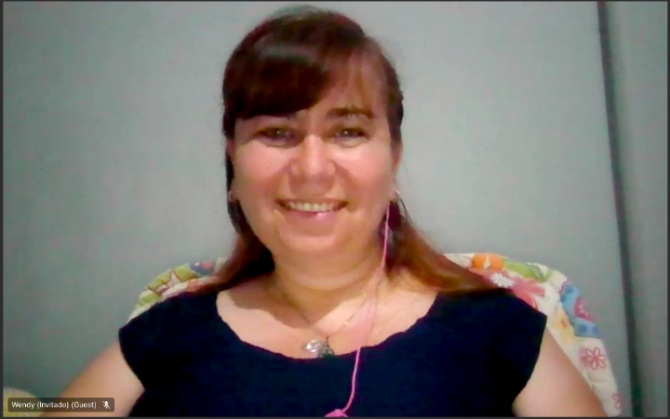 Wendy Barrantes, the president of Centro Morpho, an Independent Living center of persons with disabilities in Costa Rica.
Wendy Barrantes, the president of Centro Morpho, an Independent Living center of persons with disabilities in Costa Rica.
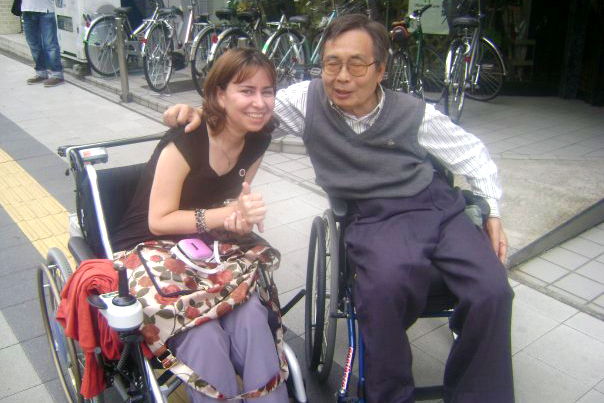 Wendy Barrantes (left) during her training in Japan at the Mainstream Association in Nishinomiya, Hyogo Prefecture.
Wendy Barrantes (left) during her training in Japan at the Mainstream Association in Nishinomiya, Hyogo Prefecture.
Barrantes acted quickly after her return to Costa Rica. In 2011, she established Centro Morpho, an Independent Living center for—and run by—those with disabilities, where she is now president. She realized that a legal framework was needed to support Independent Living and worked to promote the enactment of a law that would do so, including public support for the dispatch of personal assistants to persons with disabilities.
Until then, those with mental or intellectual disabilities were considered legally incompetent and were prohibited from acquiring property. The proposed law would also give those with disabilities legal equality so they could own property without guardianship, in the same manner as people without disabilities. In 2016, the Law Promoting the Personal Autonomy of Persons with Disabilities was passed. It was the first in Latin America to formalize a service that dispatches personal assistants to persons with disabilities.
Today, Centro Morpho is involved in the law’s operation, providing training for personal assistants and screening personal-assistant dispatch services.
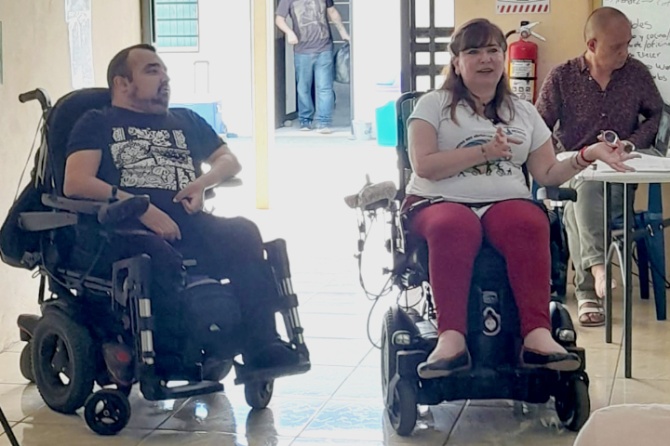 Wendy Barrantes (right) at Centro Morpho, an Independent Living center for persons with disabilities in Costa Rica.
Wendy Barrantes (right) at Centro Morpho, an Independent Living center for persons with disabilities in Costa Rica.
Sowing the seeds of Independent Living throughout Latin America
In August, 2022, eight Paraguayan leaders with disabilities participated in a 10-day training program at Centro Morpho to learn about activities for those with disabilities in Costa Rica. The Paraguayan participants interacted with Costa Ricans with disabilities who have achieved Independent Living, deepening their understanding of the significance of Independent Living and the role of Independent Living centers. Through visits to tourist sites and by using public transportation, the participants also learned the importance of realizing a society in which all people, regardless of disability, can live comfortably.
Wendy Barrantes, president of Centro Morpho, was enthusiastic about the program. “We have conducted online seminars for other Latin American countries about the experience of Costa Rica,” she said. “But this was our first face-to-face training program, and it was very successful. By giving participants hands-on experience of personal assistance, we were able to raise awareness of its importance. We were also able to discuss establishing a system that enables Independent Living.” Barrantes hopes to follow up with the participants in the future as they work toward the enactment of a “Law of Independent Living and Personal Assistant” for those with disabilities in Paraguay.
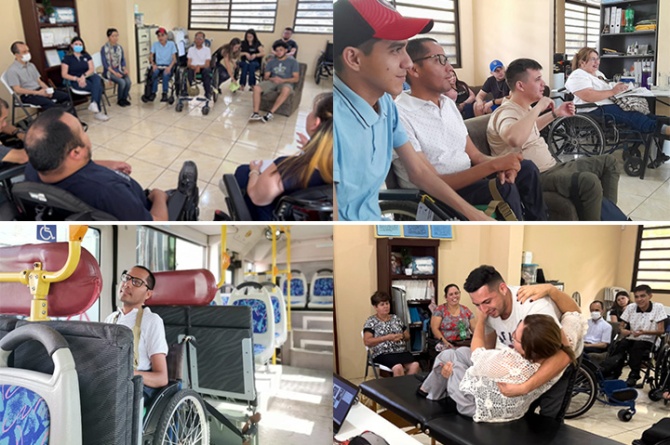 Paraguayan leaders with disabilities during their visit to Centro Morpho. Clockwise from top left: people from both countries participating in a discussion; Paraguayan participants asking questions about the process of enacting Costa Rica's law regarding people with disabilities’ independence; demonstrations of personal assistance stressed its importance; participants received assistance while using public transportation.
Paraguayan leaders with disabilities during their visit to Centro Morpho. Clockwise from top left: people from both countries participating in a discussion; Paraguayan participants asking questions about the process of enacting Costa Rica's law regarding people with disabilities’ independence; demonstrations of personal assistance stressed its importance; participants received assistance while using public transportation.
Barrantes expressed her pride in how the seeds of Independent Living that were sown in Costa Rica have borne fruit and spread to other countries in Latin America. “Each country is currently in the process of drafting laws adjusted to the actual situation in that country,” she said. “If they are all passed, an estimated 83 million people with disabilities in Latin America will benefit.” She believes that the strong determination of those involved will see the laws enacted. “We will continue to work hand in hand with people with disabilities in other countries to change reality and the world,” Barrantes said.
Bringing change to Bolivian society
Bolivia is one example of where the seeds sown by Barrantes have borne fruit. Feliza Ali Ramos is president of Revibo, a Bolivian independence network, and is one of those who have become active in mobilizing their country’s approach to independent living. In 2011, she participated in the Knowledge Co-Creation Program conducted by JICA and the Mainstream Association. Since then, she established associations for persons with disabilities in each Bolivian province and held five national conventions throughout the country, calling for the enactment of a Law of Independence. This December, a bill creating the law is scheduled to be submitted to the Bolivian Diet.
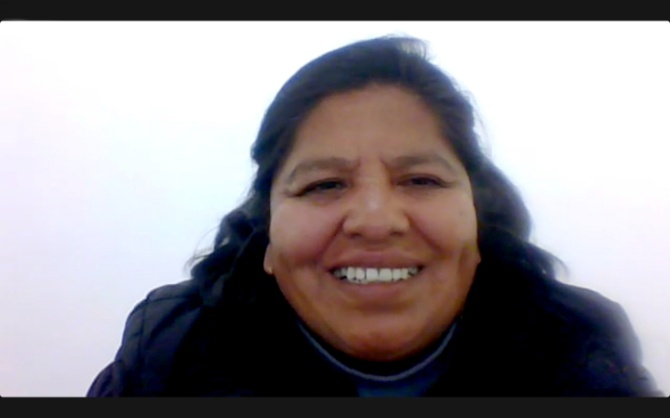 Feliza Ali Ramos, president of Revibo, a Bolivian independence network.
Feliza Ali Ramos, president of Revibo, a Bolivian independence network.
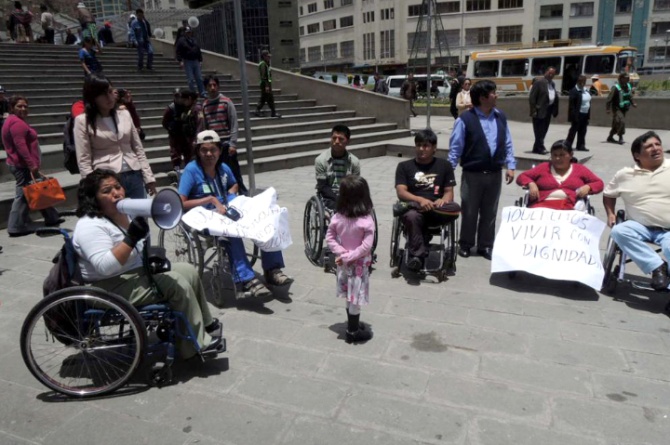 Ali Ramos (left) appeals for the enactment of the Independent Living Support Law at the National Convention of Independent Living Support.
Ali Ramos (left) appeals for the enactment of the Independent Living Support Law at the National Convention of Independent Living Support.
Ali Ramos was in a car accident when she was 27 years old and has been in a wheelchair ever since. “At one time, I couldn't accept my own disability. I thought that the country and government should help those of us who are disabled, since I saw us as victims,” she said.
Like Barrantes, Ali Ramos’s change of mindset was triggered by the Knowledge Co-Creation Program conducted by JICA and the Mainstream Association. Witnessing people with severe disabilities living on their own with the necessary assistance reminded her that she, too, was a human being. “If we take the initiative ourselves, society will change. I returned to Bolivia with a strong determination to put this into motion,” she said.
Ali Ramos has been greatly influenced by the work of Wendy Barrantes in Costa Rica. “I am encouraged by her daily struggles in a similar Latin American country,” she said. “And I have a lot to learn about how an Independent Living center for persons with disabilities operates.”
In the future, Ali Ramos aims to expand the number of current Independent Living centers for persons with disabilities in the country from the present total of two to at least one in each Bolivian province. Public support and the cooperation of a large number of partners will be necessary for each center to be financially independent and provide services such as the dispatch of personal assistants.
While understanding the challenges ahead, Ali Ramos is looking to the future. “Previously, I was the only one in Bolivia shouting for Independent Living for persons with disabilities,” she said. “But now many are speaking out. And we can change. In fact, after the training from JICA and the Mainstream Association, I even began to appreciate having a disability. I am very happy now to be able to engage in this activity with passion.”
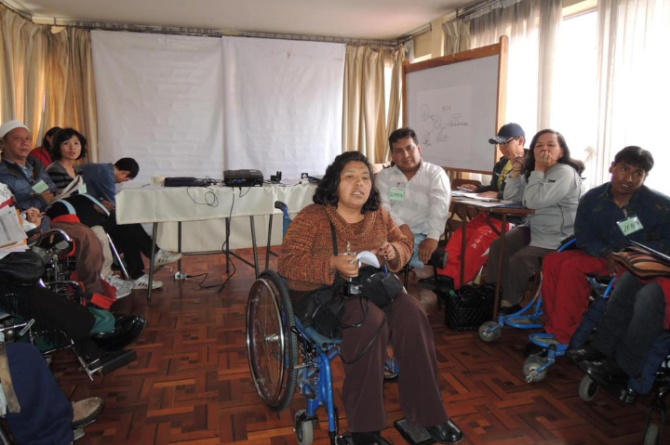 Ali Ramos speaks to staff at an Independent Living center for persons with disabilities in Bolivia.
Ali Ramos speaks to staff at an Independent Living center for persons with disabilities in Bolivia.
An expanding circle of trainees
JICA’s Knowledge Co-Creation Program is one of the reasons behind the expansion of actions toward realizing Independent Living for persons with disabilities in Latin America. Both Wendy Barrantes and Feliza Ali Ramos have participated in the program. The knowledge, experience, and desire of the trainees also led to the formation of the Latin American Network for Independent Living (RELAVIN) in 2020. Former trainees in the network are working to enact laws regarding Independent Living for persons with disabilities. Their goal is to have a personal assistance system operated by public funding throughout Latin America.
The Mainstream Association in Japan has also played a significant part in supporting the returned trainees for many years, and has aided their efforts to help people with disabilities live independently in Latin American countries.
Independent Living centers for persons with disabilities have now been established in Costa Rica and Bolivia, and those in Costa Rica have begun to gain public support. In order for persons with disabilities to achieve Independent Living within the community in the future, it is necessary to develop powerful leaders who can help change the country, as well as grassroots-level disability leaders in each community in Latin America.
The former trainees are now in a position to conduct training and create leaders, and Barrantes did this recently with an Independent Living program for persons with disabilities from Paraguay. The circle of learning among persons with disabilities will continue to expand in the future, leading to societies where those with disabilities can live fully as members of the community.
- About JICA
- News & Features
- Countries & Regions
- Our Work
- Thematic Issues
- Types of Assistance
- Partnerships with Other Development Partners
- Climate Change / Environmental and Social Considerations
- Evaluations
- Compliance and Anti-corruption
- Science and Technology Cooperation on Global Issues
- Research
- JICA Development Studies Program / JICA Chair
- Support for the Acceptance of Foreign HRs / Multicultural and Inclusive Community
- Publications
- Investor Relations





